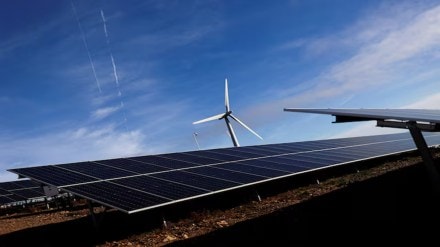To push domestic manufacturing, the government has withdrawn a scheme, which permitted duty-free import of goods for solar power generation.
In an official notification, the Central Board of Indirect Taxes and Customs (CBIC) announced that effective December 17 goods imported for solar power generation will no longer be permitted to undergo any manufacturing processes or operations within a warehouse – a facility which allows for imported items to be stored without payment of customs duties on an immediate basis.
Under the Manufacturing and Other Operations in Warehouse Regulations (MOOWR), the CBIC allows businesses to import solar modules free of duty, manufacture solar projects, and generate power for domestic sales or exports, in a customs bonded warehouse. No duty is payable by businesses till the time the modules stay within the facility.
The MOOWR scheme, first introduced in 1996 and revamped in 2019, is available for other sectors as well, such as electronics, pharmaceuticals, textiles etc.
The CBIC notification overturns a judgement of the Delhi High Court, which in May had quashed several show cause notices of the Customs Department to solar power firms. The notices had asked for payment of basic customs duty on imports, as the CBIC had said that some firms were not eligible under the MOOWR scheme. The basic customs duty on solar modules is 40% and on solar cells is 25%.
Experts say the recent government notification effectively intends to rescind the MOOWR scheme for solar power generation, retroactively impacting companies that have already availed of its benefits.
Jitendra Motwani, partner at Economic Laws Practice, said: “This will directly impact the costs for solar power generating units in India as they will be required to undertake imports on payment of customs duty which was not paid prior to issuance of the notification.”
Saurabh Agarwal, tax partner, EY said that this move may necessitate the “de-bonding” of solar farms and the payment of import duties on previously imported modules, potentially leading to significant cash flow disruptions for affected companies.
Additionally, where the Power Purchase Agreements (PPAs) do not account for tariff increases due to changes in law, this may also impact the profitability of the said power plants who have availed the benefits under this scheme, say experts.
“With the solar sector already grappling with high Customs Duty costs, the removal of the MOOWR benefit is likely to significantly increase project expenses,” said Hardik Shah, Partner at Deloitte India.
Simarpreet Singh, chief executive officer, Hartek Group said that the CBIC’s decision to revoke warehousing provisions for imported solar goods as a transformative step towards accelerating India’s solar manufacturing ecosystem and project execution capabilities. “By eliminating warehousing provisions, we anticipate a more direct path to enhancing domestic solar manufacturing capabilities,” he added.
